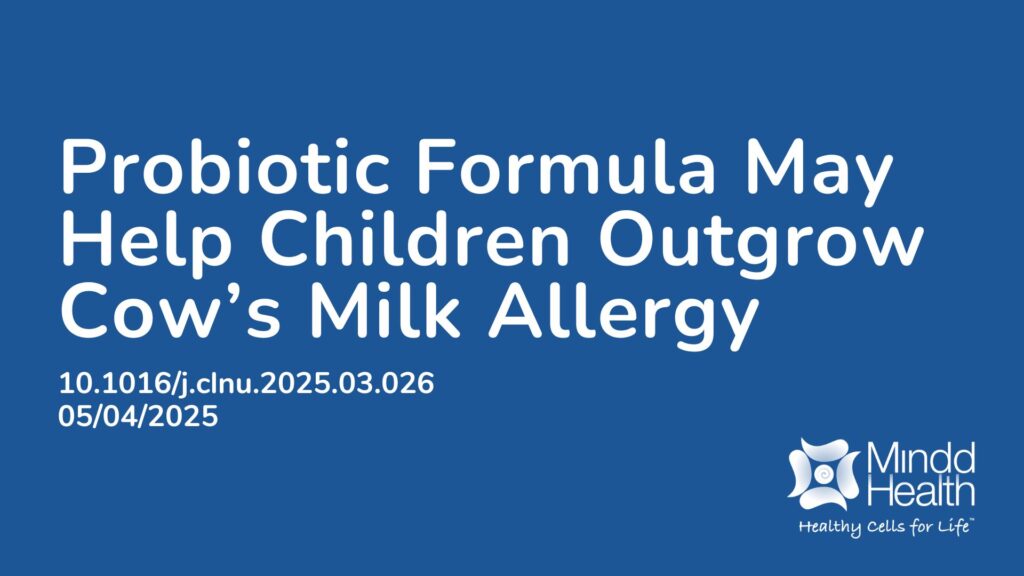Summary:
Cow’s milk protein allergy (CMPA) affects up to 3% of children and can lead to other allergies and health issues. It may have long-term health effects, including a higher risk of allergic conditions such as eczema, asthma, and hay fever, as well as certain gut and autoimmune disorders. Managing CMPA usually involves avoiding cow’s milk and using substitute formulas, such as extensively hydrolyzed or amino acid-based formulas. This six-year study compared different formula treatments and found that children who received extensively hydrolyzed casein formula with the probiotic Lactobacillus rhamnosus GG (EHCF + LGG) had fewer allergic conditions and were more likely to outgrow the allergy. Of the 313 children studied, those on EHCF + LGG had the lowest rate of new allergies and the highest rate of developing tolerance to cow’s milk. Only two cases of coeliac disease were reported, and no other autoimmune diseases were found. The authors concluded that this formula may help improve long-term outcomes for children with CMPA, supporting immune health and reducing the risk of developing other allergies.
Abstract:
Background and aims: Cow’s milk protein allergy (CMPA) is a significant health issue in the pediatric age, carrying lifelong health implications. To compare the impact of different formulas on the occurrence of other atopic manifestations (AMs), autoimmune disorders (ADs) and the time of immune tolerance acquisition in a population of children with immunoglobulin E (IgE)-mediated cow CMPA. Methods: In a 72-month prospective cohort study the occurrence of other AMs (i.e., eczema, urticaria, asthma, and rhinoconjunctivitis), ADs (i.e., celiac disease, thyroiditis, type 1 diabetes, inflammatory bowel diseases, idiopathic juvenile arthritis) and the time of immune tolerance acquisition were comparatively evaluated in IgE-mediated CMPA children treated with different formulas: extensively hydrolyzed casein formula containing the probiotic L. rhamnosus G (EHCF + LGG), rice hydrolyzed formula (RHF), soy formula (SF), extensively hydrolyzed whey formula (EHWF), or amino-acid based formula (AAF). Results: 313 subjects were evaluated: EHCF + LGG (n = 64), RHF(n = 62), SF(n = 63), EHWF(n = 60) and AAF (n = 64). The incidence of AMs was: 0.30(Bonferroni-corrected 95%CI 0.15 to 0.44) for EHCF + LGG cohort, 0.68 (0.52–0.83) for RHF cohort, 0.73 (0.59–0.87) for SF cohort, 0.70 (0.55–0.85) for EHWF cohort and 0.83 (0.71–0.95) for AAF cohort. The corresponding risk ratios are 2.28 (1.51–3.45) for RHF vs. EHCF + LGG (p < 0.001), 2.46 (1.64–3.69) for SF vs. EHCF + LGG (p < 0.001), 2.36 (1.56–3.56) for EHWF vs. EHCF + LGG (p < 0.001), and 2.79 (1.88–4.13) for AAF vs. EHCF + LGG (p < 0.001). The 72-month immune tolerance acquisition rate was higher in the EHCF + LGG cohort. The incidence of celiac disease was 2/313 (0.006, binomial exact 95%CI 0.0007 to 0.023). No cases of other ADs were reported. Conclusion: The dietary treatment with EHCF + LGG is associated with lower incidence of AMs and higher rate of immune tolerance acquisition in children with CMPA.
Article Publication Date: 05/04/2025
DOI:10.1016/j.clnu.2025.03.026



